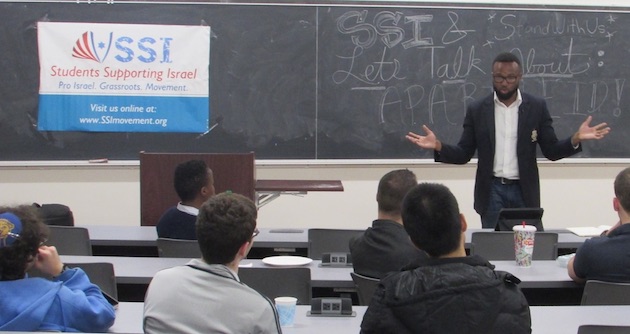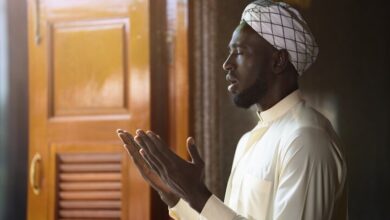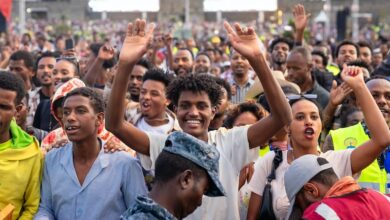Israel and apartheid: South African students weigh in

About two-dozen people file into Dodd 175 at the University of California, Los Angeles (UCLA) campus on a Thursday night, scouting out seats and picking at the kosher pizza in the back of the lecture hall.
Miyelani Pinini knows the drill. A former student president of the University of Cape Town in South Africa, she’s attended and even organized her share of free-pizza events.
But now she and a fellow South African student leader were the stars of this one, brought to campus by StandWithUs, a pro-Israel education and advocacy organization, and Students Supporting Israel, a national network of pro-Israel campus groups.
Having traveled to Israel and the West Bank on the inaugural trip for the South Africa-Israel Forum (SAIF) in January 2015, she and law student Jamie Mithi undertook a whirlwind southern California speaking tour, weighing comparisons between Israel’s treatment of Palestinians and the South African apartheid regime.
“Our apartheid narrative is literally being stolen right under our feet just as our resources have,” Pinini told the lecture hall at UCLA on Feb. 4.
Having ridden the tides of campus politics—she was removed as the university’s student president, in part because of her Israel trip—she’s well versed in a political landscape where pro-Palestinian students build solidarity with South Africa’s black majority, winning by default on a playing field where opposing Israel is the norm. She views the connection as illicit.
The Boycott, Divestment and Sanctions (BDS) movement is well-traversed territory at American colleges, with pro-Palestinian students seeking to cut ties with companies doing business in Israel and pro-Israel students loudly objecting. The movement also equates Israel and apartheid.
On American campuses, despite increased anti-Israel and anti-Semitic incidents in recent years, the chips often stack in favor of pro-Israel students, in part because many universities—including the 10-campus University of California system—defer questions about whether and when to divest to the State Department, which stands by Israel despite periodic policy disagreements.
In South Africa, the tables are turned. The ruling party, the African National Congress (ANC), accepts BDS as a plank in its platform. There, BDS is government policy.
Natan Pollack, formerly the leader of the South African Union of Jewish Students and director of program development for SAIF, has been at the brunt of that policy.
Accompanying Mithi and Pinini at UCLA, he recalled an official from the ANC youth organization spitting on the ground in front of him and telling him, “effing Jew, bloody kyke, your people are taking over the Middle East, your people are taking over South Africa.”
Many members of the South African student leadership are both anti-Zionist and anti-Semitic, Pollack said.
But it was the non-Jewish students whose stories were on display that during the lecture and Q&A organized on the student end by Liat Menna, a campus Emerson Fellow for StandWithUs and as of last year the founder of UCLA’s chapter of Students Supporting Israel.
The speakers stood in front of a black board scrawled with the words, “Let’s talk about APARTHEID!!!” Both Pinini and Mithi spoke personally on that topic, having come into contact with the ghosts of South Africa’s racist regime.
For Pinini, one tangible connection is her mother, who after earning a medical degree outside of the country returned to find that her doctorate was treated as sub-equal.
“She wasn’t allowed to operate on white people’s bodies even though she could save their lives,” she said.
Pinini didn’t know much about the Israeli-Palestinian conflict, but discussions of divestment and boycott resolutions on her campus led her to take the free trip to Israel.
Watching people of different races mixing in the streets there, she saw a picture she couldn’t reconcile with what she knew about her country’s history.
“Something clicked in the back of my mind and I said, ‘You know prior to 1994 this was not allowed in South Africa,’” she said. “Black people were not allowed to walk side-by-side with white people.”
Mithi likewise came at the conflict sideways, deciding it would be beneficial to him as a debater (he ranked number one for Africa in the World Universities Public Speaking Championships) to read up.
Originally, the topic was not his strong suit.
“I always used to lose those debates,” he said. “Like consistently I would rank fourth in any debate that had to do with Israel and Palestine.”
He approached students from both sides of the divide to learn more and propose a debate on the issue. He found pro-Israel students ready to participate while pro-Palestinian students told him, “We won’t have that debate.”
A few years later, he was taken aback when students aligned with the BDS movement disrupted a piano recital on his campus, the University of Witwatersrand in Johannesburg, because it was hosted by a Jewish organization.
He decided to take a stand against the impingement of free speech and breakdown of decorum.
“What people immediately assumed is that I’m pro-Israel and anti-Palestine, but I wasn’t even talking about that issue,” he said.
Pithi is a steadfast student of, “‘I want to hear the other side’ type thinking,” insisting that his most common response when asked for an opinion is, “I don’t know enough.”
He believes it difficult to question Israel’s right to exist. More generally, he views the Israeli position as defensible, even when he doesn’t go out of his way to defend it.
One thing of which he is certain: “An ad hominem attack does not lead to goodwill.”
Pithi’s main critique of the BDS movement is not the substance of the argument, but its form, believing that pro-Palestinian students are poisoning the well for productive and educational dialogue by attacking their opponents personally.
But beyond the rhetoric, he sees a practical difficulty in breaking ties with Israel. Traveling in the Negev, he saw firsthand how Israeli farmers have made the desert bloom.
“Africa has a lot of issues around food security, around water provision, and I was like, ‘We need to hook up with Israel, what’s the hold up?’” he said.
“I was like, ‘These are some skills that my people need,’ and I personally, just from an economic perspective, I wouldn’t boycott Israel, because I need some stuff that’s there. From a selfish motivation angle, I would refuse to boycott.”
By Eitan Arom/JNS.org






